120 guests attended “The Brain of Tomorrow – Staying Ahead of the Curve”, a seminar by Singapore Management University in partnership with MindChamps. The event was held at SMU on Tuesday, 19 August 2014.
A panel of experts shared insights drawn from the areas of Neuroscience, Mind Development, Creativity Research and Music to reveal what you can do to amp up your brain’s learning potential. Read on for some brain-boosting takeaways.
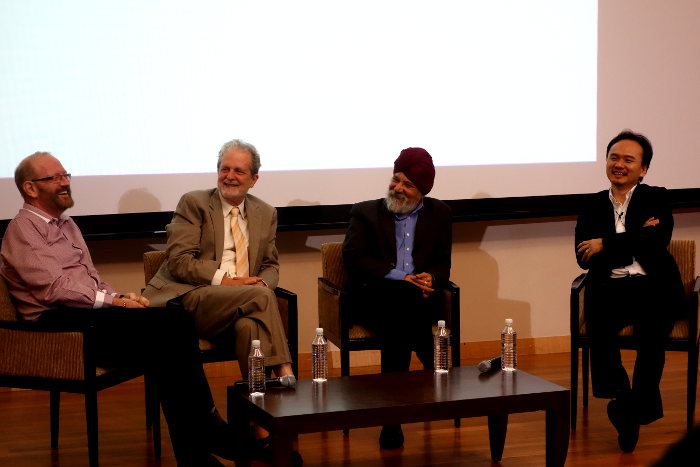 (From left to right) Brian Caswell, award-winning author and Dean of Research and Program Development at MindChamps; Professor Larry Scripp, MindChamps Dean of Music in Education and former Harvard music researcher; SMU Associate Professor and creative thinking expert Kirpal Singh; David Chiem, Founder and Group CEO of MindChamps
(From left to right) Brian Caswell, award-winning author and Dean of Research and Program Development at MindChamps; Professor Larry Scripp, MindChamps Dean of Music in Education and former Harvard music researcher; SMU Associate Professor and creative thinking expert Kirpal Singh; David Chiem, Founder and Group CEO of MindChamps
1. Feel Good When You’re Learning
Emotions are the source of learning. Everything we learn is affected by how we feel when we learn it. That’s why MindChamps adheres to 100 percent respect, zero percent fear.
That’s a good thing to remember the next time you’re close to losing your patience when teaching your child math!
“If a child is given a horrible, emotionally damaging experience when he learns something, from then on he won’t want to touch it. That’s how reluctant learners are created,” said award-winning author Brian Caswell, who is also Dean of Research and Program Development at MindChamps.
2. Make Connections and Seek Patterns
Our brains are capable of remembering five to nine pieces of information at once – which might not seem like a lot. That means you’ll find it pretty easy to mentally calculate 24 + 12, but impossible to solve a 24 – digit math problem like 10, 323, 423 + 91, 321, 432 – 42, 837, 155 in your head.
But how is it that when we see the alphabet for a second, we can write it out from memory even when it exceeds nine letters? “It’s 26 letters but you recognize it as a single idea,” Caswell said. “It’s one piece of information, not 26.” The same can’t be said if you’re presented with 26 random, scrambled letters.
The brain is a pattern – recognition machine. With the alphabet, we have created a pattern in our minds that we can go back to and use. The secret to turning complex, disparate ideas into ones we remember is by connecting them into a single pattern or concept.
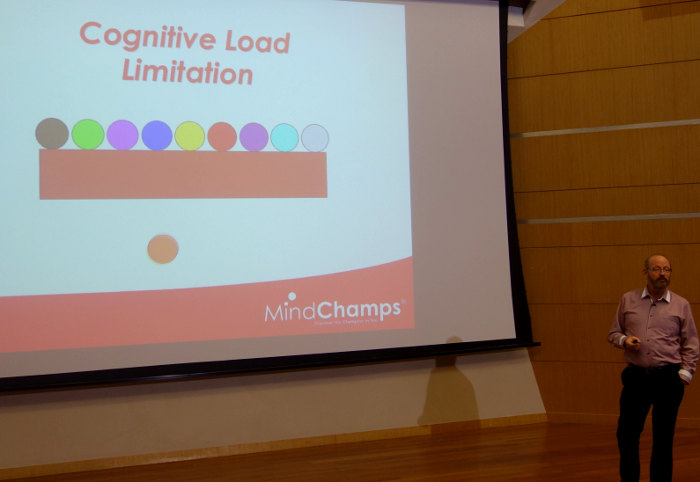 Imagine a groove that can only hold nine marbles. Adding another marble will cause one or all of them to fall off. That’s what happens when we try to remember and work with nine pieces of information in our brain at once.
Imagine a groove that can only hold nine marbles. Adding another marble will cause one or all of them to fall off. That’s what happens when we try to remember and work with nine pieces of information in our brain at once.
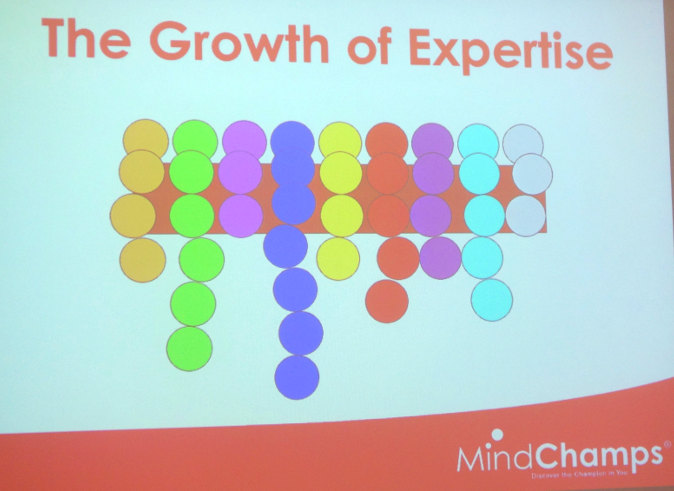
Imagine how much information your brain can hold if each of the nine “marbles” represented a whole scheme of ideas.
3. Creative Thinking Will Get You Ahead
Associate Professor at SMU, Kirpal Singh, encouraged employing creativity and innovation in all areas of life, especially at home, school, and work.
One of the ways to feed your creativity is by making music. “When you make music, there are multiple simultaneous processes that are ongoing. You learn in flow and improvise,” said Professor Larry Scripp, MindChamps Dean of Music and Founding Chair of the Music-in-Education Concentration of the New England Conservatory.
“Creativity comes out of dedication, observation, and watching other people doing what they’re doing,” Scripp added. “Then you go one step further than what somebody else does.”
As parents, we should nurture our children’s inventiveness – no matter how crazy their ideas may be. “Don’t dismiss them with your authority and power,” Singh said. “Do away with dampeners of creative thinking, like saying, ‘Oh people already do that’ or ‘If that idea’s so good, then why hasn’t someone done it yet?'”
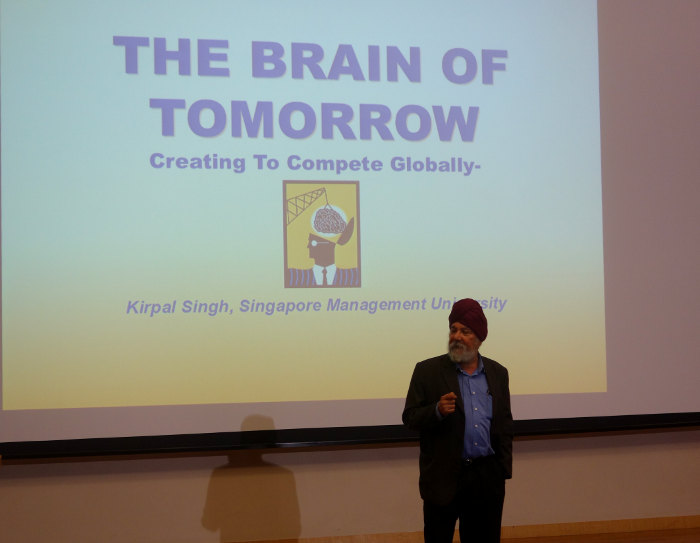 Professor Kirpal Singh advised exploring and breaking boundaries to build creativity.
Professor Kirpal Singh advised exploring and breaking boundaries to build creativity.
Want an easy exercise to foster your child’s imagination? Simply tell him to close his eyes and dream away, Singh advised. And the same goes for adults; the more childlike we can become in that dream state, the more high-pitched our imagination will be.
The call for creativity resonated with Ann Lim, mother of two daughters ages 19 and 24. “Singaporeans have a problem with thinking outside the box,” Lim said. “A lot has to do with the mind-set. We have kiasu syndrome, the same old mindset, but the world is changing so fast. There’s a lot of pressure for students and too much fear sets them back. When you pressure a child, do you think he can relax and dream?”
4. Have the Courage to Challenge Conventions
One of the blocks to creativity is enslavement to protocols. Although many of them serve practical purposes in our lives, they’re hardly conducive to creativity. According to Sir Richard Branson, the founder of Virgin Group, convention is the enemy of progress. We must break through our fear of embarrassment or rejection.
So, the next time your child breaks a rule, don’t be too quick to chastise him. Perhaps he found a better way to do something than what was told.
“It’s good to do things in an orderly manner but we can use our own judgment. Sometimes it’s okay to deviate from guidelines,” said Margaret Low-Tremolieres, mother of two boys ages 5 and 9. “Parents have to change their way of thinking before they can motivate their children.”
5. Risk Failure to Succeed
“The only time we’re going to learn anything is to step a little out of our comfort zone,” said Caswell. “Yes, sometimes we might do things we regret doing, but failure is the birth of success.”
David Chiem, Founder and Group CEO of MindChamps, emphasized the importance of embracing failures or setbacks as seeds for growth and turning them into setups for success. Drawing from the art of turning the force against you into your own strength, Chiem encouraged everyone to “judo” their weaknesses.
Perspective plays a large part in handling failure. Chiem shared an anecdote about Nelson Mandela, who, upon being released from 27 years of imprisonment, was asked, “How do you feel having waited 27 years for this moment?” Mandela’s reply was, “I did not wait. I prepared.”
6. Don’t Settle for Ordinary
“Ordinary” isn’t the worst thing you could be in life. But it’s the one thing champions can’t stand to be. They want to be great. They have an intense need to put their own stamp of uniqueness on what they do. Steve Jobs was such a man, said Chiem. So was Picasso.
So don’t accept the status quo. Disrupt rigid structures. Have high expectations, and work to fulfill them. Ready to start? First, acknowledge your uniqueness, and create an environment that grows your unique brand. But don’t be discouraged if it takes some time. As Chiem said, “It’s not an overnight thing – it’s a progress.”
By Jenny Tai.
* * * * *
Like what you see here? Get parenting tips and stories straight to your inbox! Join our mailing list here.
Want to be heard 👂 and seen 👀 by over 100,000 parents in Singapore? We can help! Leave your contact here and we’ll be in touch.











































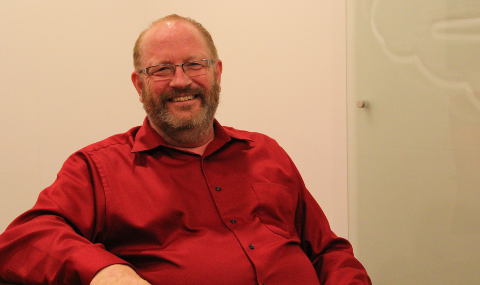















Leave a Comment: